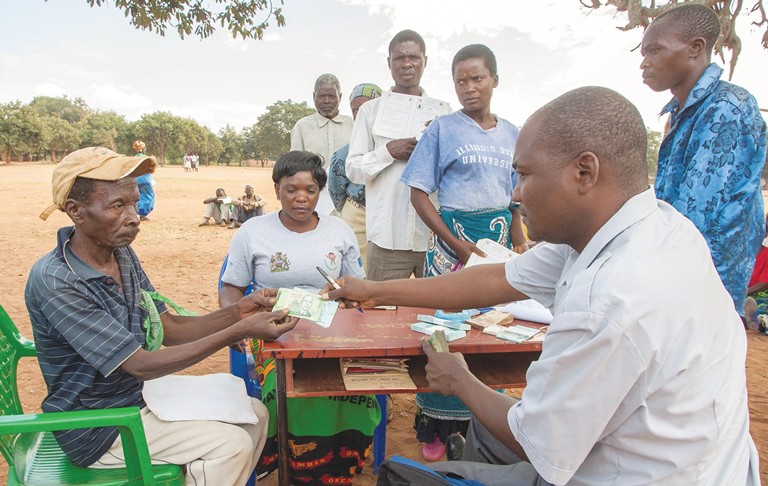More than cash transfers
Efforts are underway to strengthen governance and accountability in Malawi’s Social Cash Transfer Programme (SCTP), wirites Unicef communications officer REBECCA PHWITIKO.
At 79, Masiye Kalaye is nostalgic about the good old days. She says life was much easier back then.

“There were many opportunities and farming was still a lucrative business,” he says. “We used to grow onions, potatoes and other vegetables, which was enough to make a decent living. But these days, life is hard. There are no markets for our crops.”
Until 10 years ago, Masiye was selling her produce to the east of her village in Ntcheu, in Central Malawi.
As she grew frail and could not make the uphill trip with the heavy load, her son took over the work. But selling vegetables is no longer a viable business and Masiye’s family has fallen on hard times.
The family—which includes four children and 16 grandchildren, crowded together in a small compound of three grass-thatched huts—has met the criteria for assistance from the government.
In a country where 71 percent of people live below the international poverty line, making $1.90 or less per day, many like Masiye’s family receive money from the programme.
The SCTP prioritizes child and female headed families such as Masiye’s, the chronically ill, the elderly and those whose labour is constrained. Eligible families receive additional support for every child who is in school to cover school related expenses.
Kalaye was initially enrolled into the SCTP as a sole beneficiary, receiving K4 000 per month.
Empowering voices
Within the SCTP, Unicef is supporting a social accountability component to empower social cash transfer beneficiaries to ensure accountability from duty bearers and service providers. With funding from Irish Aid, Unicef is helping to raise awareness about government’s social policy and the government’s responsibilities to its citizens.
Sevelino Banda, a member of the local community social support committee (CSSC), met Masiye during a routine visit and discovered she was getting less than she was eligible to receive as she was missing out on money to cater for her grandchildren who were attending secondary school.
Sevelino reported the issue to the local district council and the situation was rectified. As a result, Masiye’s monthly allocation was more than doubled from K4 000 to K10 500.
“If people like grandma Masiye see social protection as a right, they feel more empowered to question duty bearers and use the complaints and feedback mechanisms when they need to,” says Unicef Malawi chief of social policy, Beatrice Targa.
Unicef’s partner, Development Communication Trust (DCT), has oriented local development committees toward an oversight role in the SCTP programme.
DCT organises community dialogues and public hearings to get feedback from families enrolled in the SCTP programme. The intervention has also helped strengthened the grievance redress mechanism by training CSSCs such as Sevelino on how they can address or scale up any issues reported by SCTP beneficiaries.
Powering education
Sevelino and other CSSC members now help process changes in a family’s profile when there is a new birth or when a child graduates from primary to secondary school. They validate the information provided by the beneficiary household using school records and other information.
Cecelia, 16, was added to her grandmother Masiye’s SCTP beneficiary profile as a result of Sevelino’s training and diligent follow up.
She goes to Dombole Secondary School, a 90-minute walk from her home. She loves singing and her favorite subject at school is Mathematics. She hopes to be a nurse someday.
Masiye wants her two grandchildren to finish secondary school and receive the opportunities she never had.
“These days you cannot survive without education. Our onions are still in the farm, but there is no market for them so it’s important for the girls to go to school. We cannot rely on farming anymore.”





